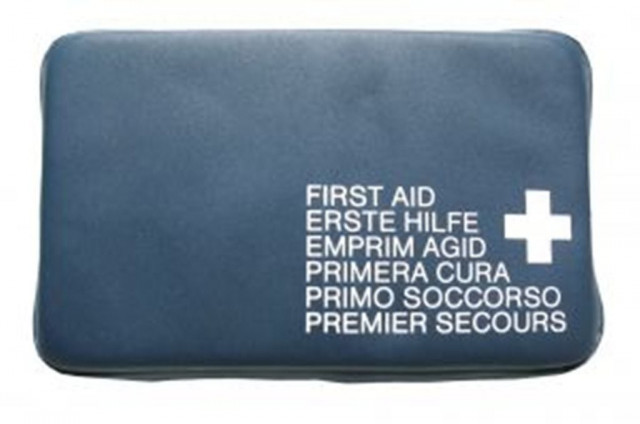First response: How to save a life
A majority of trauma patients who die could have been saved if given proper first response.

First aid kit. PHOTO: FILE
Small wonder then that orthopedic surgeon Dr Saeed Minhas knew it was a “do or die” situation when he got a phone call from the ER in the middle of his rounds at Jinnah hospital, Karachi. He was told that a 16-year-old boy had arrived with the facture and was bleeding profusely. The patient had arrived after being turned away from other hospitals. “He was transferred to JPMC from a number of other hospitals which insisted he could only be treated by a vascular surgeon,” says Dr Minhas.
With 25 years of experience handling traumatic fractures, Dr Minhas knew that the boy may not make it in time. As he raced to the ER he started giving orders on the phone for the nurses to control the bleeding by applying direct pressure and treating the boy for shock by giving him oxygen and fluid resuscitation. But by the time he got there, it was too late.
The tragedy is doubled by the fact that the boy’s life could have been saved. He did not need a vascular surgeon to control the bleeding. Any trained first responder or emergency physician could have done that. “If only some[one] had just compressed the femoral artery with their thumb, the bleeding could have been controlled,” Dr Minhas laments.
An ER doctor at a tertiary-care hospital in Karachi, Dr Haider, adds that cases of multiple traumas, for example gunshots or falls or road traffic accidents, come about once a day. “Victims are brought in a way that is so harmful that it causes more injuries,” he adds. “Their chances of survival are less than half.” A majority of trauma patients who die could have been saved if given proper first response.
To address this problem, Prof. Rashid Jooma, a neurosurgeon and former director of Jinnah hospital, set up Primary Trauma Care (PTC) Pakistan in 2004. So far hundreds of workshops have been held in Sindh alone and about 6,000 doctors have been trained. “I learnt more in these two days of the workshop than in two years of medical school,” said one medical student, who participated. “Even though these are just the basics, they make me feel more confident as a student and [a] future doctor.”
Closely related to PTC Pakistan, is the First Response Initiative of Pakistan (FRIP). This organisation was set up by a group of young doctors, who witnessed the mishandling of victims at a bomb blast scene and resolved to intervene. “It was shocking to learn that although a majority of doctors may be able to quote the latest treatment of the rarest diseases, very few can actually resuscitate a dying victim,” says Dr Akbar Herekar, co-founder and president. “Simple skills, that take merely hours to learn, can make the difference between life and death if instituted on time. A doctor or paramedic is not always available when needed. At FRIP, we believe every human should know how to save a life.”
FRIP trains medical students and young doctors not just in the basics of pre-hospital care, but to reach out to the people of Karachi to equip them with basic life-saving skills. Workshops have been held in Ibrahim Hyderi and Rehri Goth, for example.
Doctors are not necessarily trained to deal with emergencies. As Dr Minhas puts it: “Previously only army doctors were trained to handle trauma, but now the war is here, on our roads. Every doctor should be trained if they are really to own the white coat.”
Published in The Express Tribune, Sunday Magazine, October 13th, 2013.



















COMMENTS
Comments are moderated and generally will be posted if they are on-topic and not abusive.
For more information, please see our Comments FAQ